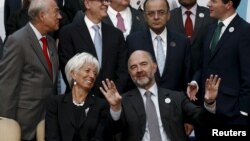Finance ministers and central bank chiefs from the Group of 20 leading economies say global growth is slower than they had expected, but they are confident that worldwide economic recovery will gain momentum.
In the final communique of a two-day summit in the Turkish capital, Ankara, top finance officials from the G-20 nations promised Saturday to take “decisive action” to keep economic recovery upbeat. They also pledged to refrain from competitive currency devaluations — a reference to China's recent devaluation and a warning to emerging-market nations not to take similar action to protect their own currencies.
Financial markets worldwide have been in turmoil for weeks due to concern about a slowdown in China's economy and its sudden devaluation of the yuan last month.
Since currency devaluations effectively lower the price of a country's exports, there are concerns that China's devaluation may prompt other nations to take similar action. Beijing's monetary action already has driven down the value of many smaller countries' currencies. The G-20 vowed to "resist all forms of protectionism."
U.S. officials said the American delegation in Ankara, led by Treasury Secretary Jacob Lew, met with its Chinese counterpart on the sidelines of the summit. The U.S. side said it was important for China to make clear that it will allow the yuan to move "up as well as down" in response to financial markets.
A senior U.S. Treasury official told reporters, "It would be a very bad thing for the global economy if we get into a pattern of competitive devaluation." During detailed discussions, the official said, all agreed that "competitive devaluation is a threat that has to be guarded against."
Another major theme at the G-20 meetings was the monetary policy of the U.S. Federal Reserve, which has been expected for months to lift interest rates to match the quickening pace of U.S. economic growth.
Financial officials in many other countries are concerned that higher U.S. interest rates will persuade foreign investors to shift their capital into dollar-based funds and reduce financial liquidity — the supply of money available to fuel business growth — in emerging-market nations.
In line with the improving world economic outlook, the G-20 said a tightening of monetary policy through interest rate hikes "is more likely in some advanced economies." However, the group urged central banks and governments not to rely heavily on interest rates alone, but also to practice fiscal policies that support growth and create jobs.
The head of the International Monetary Fund, Christine Lagarde, told reporters Saturday that the U.S. Federal Reserve in particular should increase interest rates only when it is certain that all growth indicators dictate such a move.
"It is better to make sure that the data are absolutely confirmed," Lagarde said, "that there is no uncertainty ... [about] price stability, nor on the front of emplopyment and unemployment, before it makes that move."





